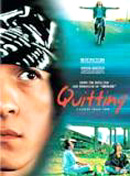
Director: Zhang Yang 2001
In his third film with Imar, Zhang Yang directs another heart-rending story of strained family relations in Quitting. Quitting has none of the heartwarming scenes of brotherly and parental love that won its 1999 predecessor Shower a number of awards and garnered it top box office winnings at home and abroad. Quitting broaches the dirty subjects of drug addiction, westernization and the generation gap as experienced, more or less, by the family of actor Jia Hongsheng.
A graduate of the Central Academy of Drama, as is the director, Jia became a minor star in the early 1990s before descending into a life of drug abuse and refusing acting jobs for five years before re-emerging in Suzhou River (Suzhou He) last year in the role of Mardar. This film tells the story of his off-screen life from the age of 25 to 30.
Apparently, the actor began smoking dope while acting in the Zhang Yang-directed play Kiss of the Spiderwoman at his alma mater. The film also depicts the actor's obsessive love of The Beatles' John Lennon. But Jia's life really turns a corner for the worse when his parents arrive in Beijing from Jilin to live with him and his younger sister who supports him now that he spends all his time listening to rock music and smoking pot.
In the film, Jia says that he had stopped taking drugs before his parents' arrival, and indeed, the conflict with his parents seems to be a result of a generation gap rather than Jia's drug problem. The film presents detailed and chilling evidence of the kind of conflict often seen in Chinese families between the older, more conservative generation, and the younger generation - be they spoiled by addictions, influenced by western music and culture, or simply displaying different personalities. Their conflict reaches a crux when the younger Jia, while drinking with his alcoholic father, repeatedly slaps the older man. Jia's mother and sister call the police, who take him to a mental hospital. The mental institution forces Jia Hongsheng to face up to his obsession with John Lennon, his drug habit, and his conflict with his parents.
The film subtly probes more relationship and addiction nuances than its pre-release publicity of a drug addict kicking the habit suggests. As an added tension builder, nearly all of the actors in the film play themselves. Among other topics, Quitting leaves the viewer wondering exactly how much of the film is true-to-life and how much of an influence the director had on the final product. Still, Quitting is one of those films that leaves you thinking and talking about it for days afterwards.
(Cityweekend January 15, 2003)

